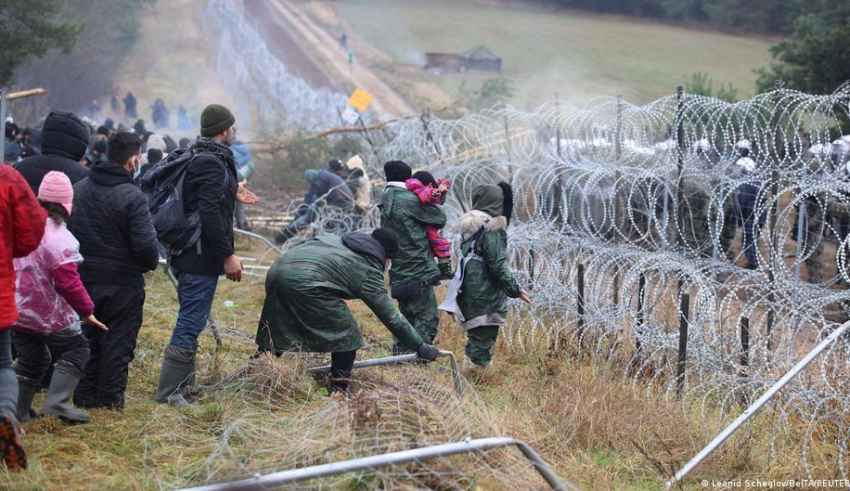
Thousands of migrants from the Middle East are stopped at the border between Belarus, Poland, Lithuania and Latvia, due to the granting of tourist visas by the Belarusian government. Among them are people from Syria, Iraq, Yemen and Afghanistan who try to enter Europe in the absence of safe channels but are prevented from seeking protection from EU countries. Thousands of citizens of the mentioned countries have become a tool for the political pressure currently being exerted by the Belarusian regime as leverage on EU states to reverse sanctions[1]. Migrants are being transported in an organised manner and Belarusian officials are contributing to this illegal migration programme by issuing visas to foreigners to enter Belarus and then escorting them to its borders with European countries.[2]
Since late summer 2021, women, men and children have gathered at the Polish-Belarusian border waiting to cross the border and enter Europe. Poland, as well as other affected countries such as Lithuania and Latvia, refuses migrants to enter its territory and has declared a state of emergency at its borders, thus effectively suspending the guarantees provided by international law regarding the possibility to seek protection.
The initial phase of this crisis developed at Lithuania’s border with Belarus in spring 2021 where the first migrants were mainly from Iraqi Kurdistan. The flows then began to increase from tens to thousands of illegal crossings. The Lithuanian authorities immediately took action to deny entry but more than 4,000 people crossed the border in 2021 leading Vilnius to declare a state of emergency and reinforce the border. Migrants also gathered at Belarus’ border with Latvia, which followed Lithuania’s example by declaring a state of emergency and tightening border security.
Various sources reported Minsk’s attitude of facilitating the travel of people from the Middle East to Belarus, and then to the border with Poland, Latvia and Lithuania. The Belarusian authorities formally simplified tourist visa procedures for citizens of several countries and refused to deport those who overstayed their visas. The number of direct flights from Iraq, Syria and the Emirates to Belarus has more than doubled. The Belarusian guards have done nothing to hinder those trying to cross into Poland, but, as the Latvian, Polish, Lithuanian authorities and also Frontex claim, the guards have promoted such efforts, escorting large groups to the border and possibly even pushing them to cross[3].
Belarusian leader Aliaksandr Lukashenka is seeking to be recognised by the EU as president and for the latter to ease or withdraw the economic sanctions that have undermined the Belarusian economy. As is well known, these sanctions were applied after Lukashenka ordered an unprecedented and violent repression of opposition members and protesters in the run-up to the Belarusian presidential elections on 9 August 2020. Lukashenka, who has ruled the country since 1994, claimed to have won that contest with more than 80% of the vote[4]. The EU, U.S., UK and Canada refused to recognise Lukashenka’s victory, due to evidence of manipulation.
It is very clear that Belarus will not block anyone who tries to enter the EU while also claiming that the crisis is the result of the West’s failed policy in the Middle East and accusing the EU of violating humanitarian principles, including their own commitments under a number of UN and EU instruments, to allow people to seek asylum.[5]
Although there is a general mistrust among European officials that Moscow is driving the crisis from behind the scenes there is no reliable evidence that Russia is directly involved in orchestrating the events. Nevertheless, Russia has consistently supported Lukashenka in this situation and has often promoted his views as hypocritical of Western responses to the crisis. Moscow says European capitals talk about human rights but refuse to accept individuals they characterise as refugees and even use force to block their entry. Putin also urged direct dialogue between Lukashenka and European countries, and offered to facilitate it by suggesting that the EU respond to Belarus as it did to Turkey in 2016, when it provided billions in aid to support millions of refugees in Turkey rather than allowing them to cross over to EU states. “Why can’t the Belarusians, who have certain needs, be helped in the same way so that the refugees, whom Poland and Lithuania absolutely do not want to let into their territory, can somehow live under normal conditions?” asked Russian Foreign Minister Sergei Lavrov[6].
It seems that double standards are being used when it comes to managing migration crises in Europe. This seems to be the approach chosen by Poland (and Europe) when it comes to migrants. If with the potential refugees arriving in recent months from Iraq and Syria via Belarus, the government of Mateusz Morawiecki had chosen a hard line, with walls and rejections, and with the tacit consent of Brussels, with the Ukrainian crisis Warsaw has changed its strategy: now the doors of the migrants are open and the country is ready for a possible wave of migrants fleeing from Russian troops[7].
Those who ultimately paid the price for this crisis were and are the migrants, women, children and men, who were forced to cross a cold winter in inhuman conditions and whose survival still hangs in the balance. Many did not survive. They, like many others, continue to pay the price for the international chessboard of political, economic and social balances that are extremely fragile and afflict the current reality which is completely in a state of chaos an uncertainty.
[1] https://www.theguardian.com/world/2021/aug/10/latvia-and-lithuania-act-to-counter-migrants-crossing-belarus-border
[2] https://bukimevieningi.lt/migrantu-krize-lietuvoje-nuo-absurdo-iki-tragedijos/
[3] https://m.delfi.lt/ru/news/article.php?id=87855577
[4] https://www.nytimes.com/2020/08/09/world/europe/belarus-election-lukashenko.html
[5] https://www.crisisgroup.org/europe-central-asia/eastern-europe/belarus/behind-frictions-belarus-poland-border
[6] https://reliefweb.int/report/belarus/behind-frictions-belarus-poland-border
[7] https://www.dw.com/en/poland-readies-for-possible-refugee-influx-from-ukraine/a-60844694
By The European Institute for International Law and International Relations.















